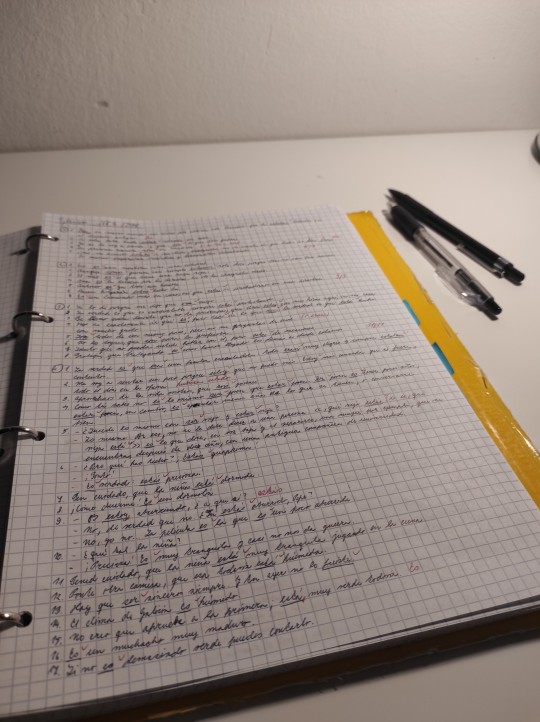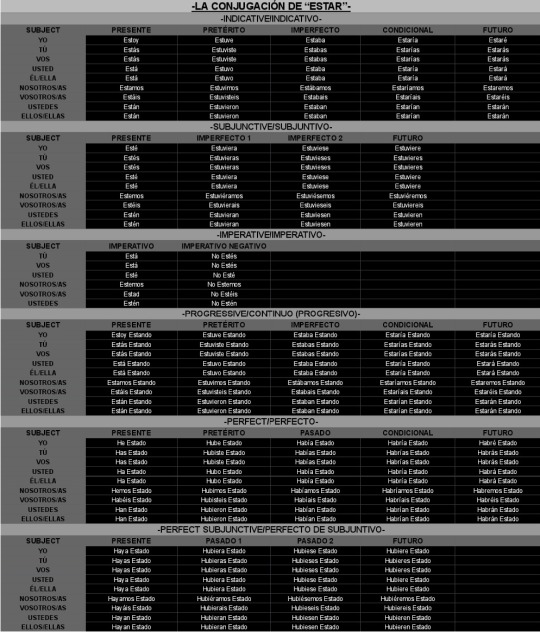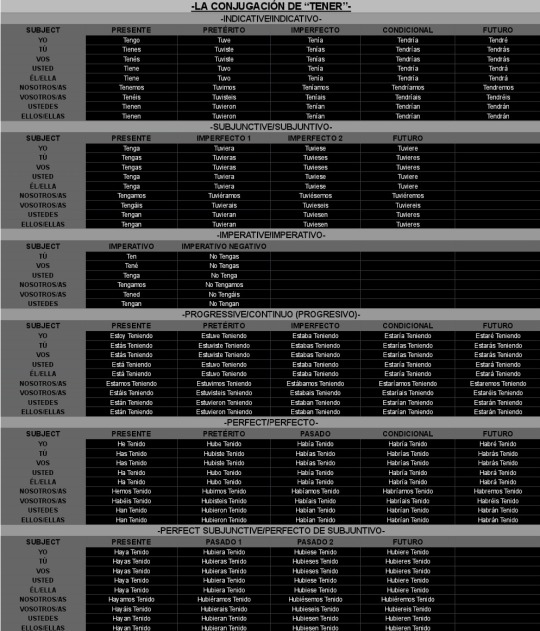#Spanish grammar
Note
How can I start learning Spanish?
If you are an absolute total beginner, my biggest recommendation is to check out www.studyspanish.com/grammar and to check out www.conjuguemos.com which are online grammar lessons
Truly what I've found is you start with the fundamentals and you just go through your language learning journey accumulating knowledge, and it always feels like an uphill battle until one day you're aware of all the things you don't know/understand yet, but you also know how to look up what you don't know - and that's how you know you've made it
I personally find that when you're starting Spanish from nothing you need to focus on conjugations and the most essential verbs; most verbs are regular so when you understand the basic rules for -ar, -er, and -ir verbs you can do a lot in Spanish
The most irregular verbs of all time - which tend to be irregular in multiple tenses
ser
ir
ver
dar
estar
tener
venir
decir
querer
poder
poner
hacer
caber*
haber
*caber is annoyingly irregular but not the most super common verb used; it's "to fit (into a space)" like "capacity" so it's useful when you need it, but otherwise more limited
The are other little bits of grammar knowledge that you'll learn as you go, like when to use saber vs conocer, or ser and estar... things that take practice and repetition but let me know if there are any questions you have as you go and I can help give some more insight
There are other things that are important, but less all consuming, like stem-changing verbs [E->I, E->IE, O->UE] or certain irregularities, and exceptions like conocer or little things like fingir or vencer - which are littler things though more easily understood when you have some more experience
You're also going to want to devote a lot of time to the present tense which is the very first tense you're introduced to
Also - Things You Should Know At Each Level - though for your purposes I'd say you're probably A1 and A2 and try not to focus on the rest for now; you'll get discouraged if you think of all the things you don't know, trust me I was there
Additional resources:
Recommendations for beginners
https://www.bowdoin.edu/~eyepes/newgr/ats/
Word Reference Conjugator
http://spanishskulduggery.tumblr.com/post/102019421622/spanishskulduggery-spanish-tenses-moods
https://conjuguemos.com/activities/spanish/verb/1
https://conjuguemos.com/tenses/spanish/
Verbs you should know as a beginner
433 notes
·
View notes
Text
So there's this really cool thing Spanish does with pronouns. I'll try to explain (I'm no linguist, so feel free to correct me!).
Pronouns can be used as an accusative to mark the direct object of an action, as in "me bañe y me vestí" ("I showered and dressed myself"), or in "te beso" ("I kiss you"). Simple enough, right? It's your standard accusative personal pronouns.
But here's the thing. They can also be used as dative when the action concerns someone even though they may not be its direct object. For example, you can say "se rompió" ("it broke [itself]"), which is an accusative, but you can also add a dative and say "se me rompió" ("it broke [itself] [on me]"). You could very well imagine, then, a mother warning their children "¡Se me van a matar si siguen brincando así!" ("You're gonna kill yourself [on me] if you keep jumping up and down like that!"). You could even say, so as to mark a personal affection for the action's direct object, "no se me ponga a llorar" ("don't you start crying on me").
Alright. But you can take that a step forward. If your partner is looking particularly cute when going out, you could tell them "estás tan guapo que se te me van a robar" ("you're so cute they are gonna steal you from me").
#part two coming soon#?#grammar#spanish grammar#lingblr#pronouns#linguistics#spanish#reflexive pronouns#accusative#dative
77 notes
·
View notes
Text
Verbs with Strong Preterit Forms
poder
poner
saber
venir
hacer
querer
decir
traer
ser
ir
dar
ver
estar
tener
.
Patreon
#studyblr#notes#langblr#language#spanish#spanish langblr#spanish studyblr#spanish language#strong preterit forms#grammar#spanish grammar#spanish conjugation#conjugation#verbs#verb forms#spanish verbs#spanish verb forms#verbs in spanish#vocabulary#vocab#spanish vocab#spanish vocabulary
35 notes
·
View notes
Text
Tener vs Haber

Tener is used to...
To show possession
Tengo los pasaportes en mi bolso.
To talk about appearance
Mi abuela tiene ojos hermosos.
To express age
Yo tengo 25 años.
To show states of being
Yo tengo mucho frío.
To talk about illness
Ella tiene dolor de cabeza.
To express obligation
Rosa tiene que hacer su tarea.
To say “I feel like”
Ana tiene ganas de cenar comida italiana.

Haber is used to...
Express existence (impersonal verb)
Hay muchas bicicletas amarillas en el parque.
Form compound tenses (auxiliary verb)
Ellos ya se han ido.

#vocabulary#learning spanish#verbs#los verbos#español#aprendo español#spanish langblr#langblr#resources#notes#spanish language#spanish vocab#spanish vocabulary#spanish grammar#grammar#spanish rules#spanish phrases
77 notes
·
View notes
Text
Them: oh Spanish is so easy to learn!
Spanish: a veces se puede usar ser con ‘dónde’ tal y como se dice “dónde es la fiesta?”
Me: …I hate grammar.
#for anyone curious as to why it’s because ser is better to use for location in regards to a placement of an event#if you can replace ‘to be’ with ‘to be taking place’ use ser#spanish grammar#langblr#aprender español#learn spanish
14 notes
·
View notes
Text
Pensar & Creer
While pensar means to think, and creer means to believe, there are contexts in which creer is used more like the English verb to think, especially when talking about how you regard someone or something.
| Both pensar and creer can be used interchangeably in the following ways:
In the same sense as ‘to suppose’.
In the same sense as ‘to regard’.
In the same sense as ‘to consider’.
| Only pensar is a synonym of to think when used in the same sense as ‘to reflect’ and ‘to plan’.
| Only creer is a synonym of to believe when used in the same sense as ‘to have faith’ and ‘to trust’.
Cat's Note: It appears that pensar is more related to thought processes, and creer to preconceived ideas.
21 notes
·
View notes
Text
Does anyone know if some Spanish dialects that use the -se version of the imperfect subjunctive more? Does it sound archaic?
(Like estuviese instead of estuviera)
#honestly just curious#it seems like the -ra has become standard?#at least in the context of Spanish-Learners#most sites just say not to bother with -se and that it’s just more literary and not used much anymore#langblr#language#spanish#spanish langblr#Spanish speakers#Spanish language#learning spanish#Spanish grammar#trying to find what tags might drag in some nerd who’ll have an interesting answer to this /lh#quinn posts
17 notes
·
View notes
Text


15. 1 2023
Managed to pass two exams so far (The Theory of Applied Linguistics and Spanish literature), got new fabrics for reenactment and took three days off to hand-sow a 14th century linen shift. It's sooo comfy and warm, maybe even a bit too warm, so I might do another one, thinner and better suited for summer.
Failed Spanish grammar (once again, honestly I'm not even surprised), so I'm studying for that and Textile production. Let's hope for the best!
17 notes
·
View notes
Text



Conjugations of the verbs 'Ser' (To Be), 'Estar' (To Be), and 'Tener' (To Have).
#langblr#language learning#languages#español#spanish#ser#estar#tener#verb conjugations#spanish grammar
30 notes
·
View notes
Text
Language was always the companion of empire, and as such, together they begin, grow, and flourish. And later, together, they fall.
Spanish Grammar by Antonio de Nebrija
24 notes
·
View notes
Text
Okay i might be thinking too hard about this, but I've been learning Spanish on doulingo, so i don't really get a good explanation for why certain things are (i know there's a way to ask questions but I've never really been satisfied with they way they answer questions)
With words like "del" when talking about "from the (something)", is it del because it's just easier to use one word rather than "de el"? Like they're instead of they are?
Another word I've seen do that kind of thing would be mijo/mija, like shortening it to one word rather than mi hijo/hija. I'm sure there's others, I'm just now getting deeper into the language
But is this the right kind of thought process? Or am I just overthinking, as i do
#spanish language#learning languages#spanish grammar#help?#im not struggling with it my brain just saw the connection and wants to know if it actually goes anywhere#maybe struggling with if theres a proper time and place to know when to use de el vs del#but i can always ask my best friend
6 notes
·
View notes
Text
I should also mention that there are certain words that become whole new words if you use a diminutive or augmentative
As an example - la calabaza is "pumpkin" but el calabacín is usually "squash" or "gourd" or "zucchini"
Or there's la caja "box", la cajita "little box", then el cajón which is "drawer" like in a chest or bureau/dresser
You might also find some suffixes have certain implications - like -azo/a can sometimes "a blow with", so la rodilla is "knee" -> el rodillazo "strike with a knee" or "a knee", or el puño "fist" -> el puñetazo "punch". My favorite is la maza "mallet" -> el mazazo "blow with a hammer"
Another I like to use for discussing the suffixes is the base word la calza which can refer to "footwear" or "breeches" [Note: this is related to the older words for hosiery and stockings where it covered your whole lower body]... so you have the augmentative el calzón "underwear", or the diminutive el calcetín "sock"........ And THEN you have the diminutive of the augmentative, los calzoncillos which is normally "briefs"
206 notes
·
View notes
Text

5 notes
·
View notes
Photo

#spanish#studyblr#notes#flashcards#spanish flashcards#spanish studyblr#vocab#vocabulary#spanish vocab#spanish vocabulary#spanish words#langblr#language#spanish language#spanish langblr#learn spanish#learning spanish#grammar#spanish grammar
38 notes
·
View notes
Text
Spanish Imperfect
Estar in the Imperfect
Yo estaba
Tú estabas
Él/Ella/Usted estaba
Nosotros estábamos
Vosotros estabais
Ellos/Ellas/Ustedes estaban
Ser in the Imperfect
Yo era
Tú eras
Él/Ella/Usted era
Nosotros éramos
Vosotros erais
Ellos/Ellas/Ustedes eran
Regular Verbs in the Imperfect
*-ar verbs: -aba, -abas, -aba, -ábamos, -abais, -aban*
*Ex. Acompañar (to accompany)*
Yo acompañaba
Tú acompañabas
Él/Ella/Usted acompañaba
Nosotros acompañábamos
Vosotros acompañabais
Ellos/Ellas/Ustedes acompañaban
*Ex. Dar (to give)*
Yo daba
Tú dabas
Él/Ella/Usted daba
Nosotros dábamos
Vosotros dabais
Ellos/Ellas/Ustedes daban
*Ex. Trabajar (to work)*
Yo trabajaba
Tú trabajas
Él/Ella/Usted trabaja
Nosotros trabajábamos
Vosotros trabajabais
Ellos/Ellas/Ustedes trabajaban
*-er & -ir verbs: -ía, -ías, -ía, -íamos, -íais, -ían*
*Ex. Hacer (to do, to make)*
Yo hacía
Tú hacías
Él/Ella/Usted hacía
Nosotros hacíamos
Vosotros hacíais
Ellos/Ellas/Ustedes hacían
*Ex. Querer (to want)*
Yo quería
Tú querías
Él/Ella/Usted quería
Nosotros queríamos
Vosotros queríais
Ellos/Ellas/Ustedes querían
*Venir (to come)*
Yo venía
Tú venías
Él/Ella/Usted venía
Nosotros veníamos
Vosotros veníais
Ellos/Ellas/Ustedes venían
Irregular Verbs in the Imperfect
**(There are only 3!)**
*Ser (to be)*
Yo era
Tú eras
Él/Ella/Usted era
Nosotros éramos
Vosotros erais
Ellos/Ellas/Ustedes eran
*Ir (to go)*
Yo iba
Tú ibas
Él/Ella/Usted iba
Nosotros íbamos
Vosotros ibais
Ellos/Ellas/Ustedes iban
*Ver (to see)*
Yo veía
Tú veías
Él/Ella/Usted veía
Nosotros veíamos
Vosotros veíais
Ellos/Ellas/Ustedes veían
#spanish#español#language#langblr#language learning#lifelong learning#studyblr#self study#grammar#spanish grammar#verb conjugation
2 notes
·
View notes
Text
COMPLEMENTOS DIRECTOS E INDIRECTOS
Complemento directo / pronombres átonos: lo(s), la(s), le(s)
Complemento indirecto: le(s) y "se" ante otro pron. átono
Complemento directo (CD) concreta y limita el significado del verbo y hace referencia a la persona/animal/cosa sobre la que recae la acción.
Para identificar el CD preguntamos "qué" o "a quién" al verbo:
-Violeta bebió vino.
CD: Qué bebió? Vino -> Violeta lo bebió
-Luis ve a su hermano?
CD: A quién ve? A su hermano -> Luis lo ve
PD: Normalmente el CD no va acompañado de preposición pero si la lleva es "a".
Complemento indirecto (CI) es el complemento que aporta la información de la persona o ser animado sobre el que recae indirectamente la acción del verbo, quiere decir, sirve para designar al receptor:
-Lorena regaló un reloj a su madre.
CI: A quién lo regaló? A su madre -> Lorena le regaló un reloj.
Habitualmente el CI suele ir precedido por una preposición como "a" o "para". Podemos preguntarnos "a quién/para quién/a qué" y ver qué es lo que te responde el verbo.
-Pedro compró las flores para Ana.
CI: A quién? A Ana -> Pedro le compró las flores.
Construir una frase con CD y CI:
"Juan escribe" es una frase muy amplia, pero si la añadimos un CD se vuelve más concreta: Juan escribe una carta.
Si le añadimos un CI se delimita aún más: Juan escribe una carta a su novia.
Ejemplos:
Lucas abre la puerta a su vecino
Sol le hace los nde el verbo. Más ejemplos:
Pedro compró las floredeberes a su hermana
El médico le receta medicamentos a tu padre
María escribe un poema a su madre
#spanish langblr#maraspanishnotes#spanish grammar#complemento directo#lengua#complemento indirecto#gramática
6 notes
·
View notes